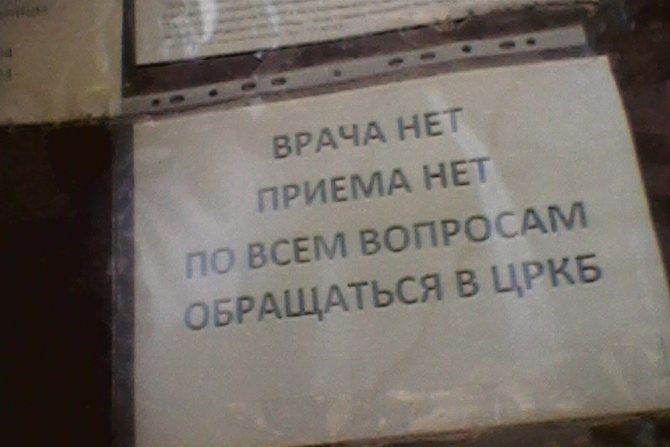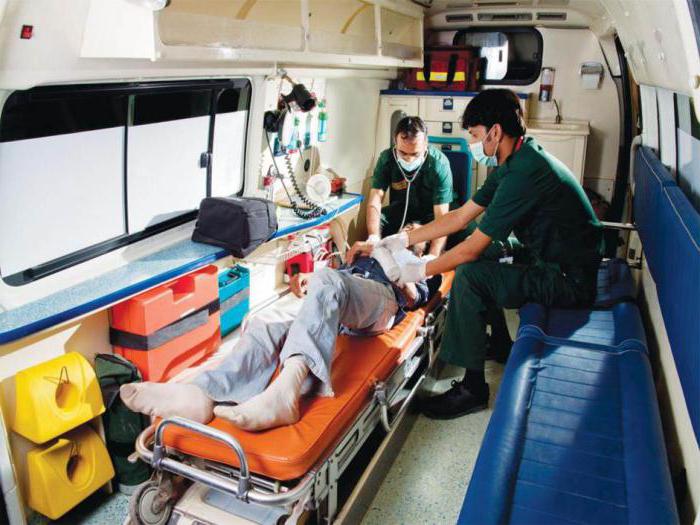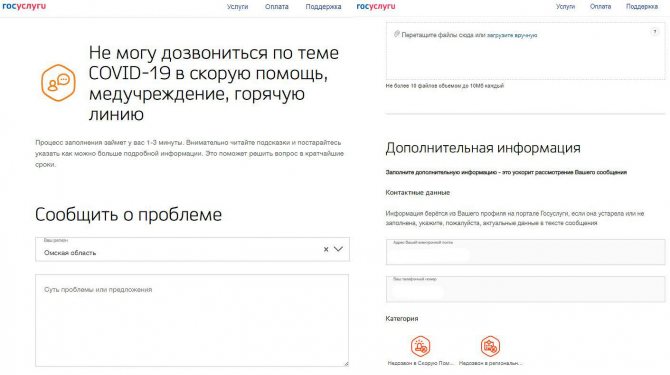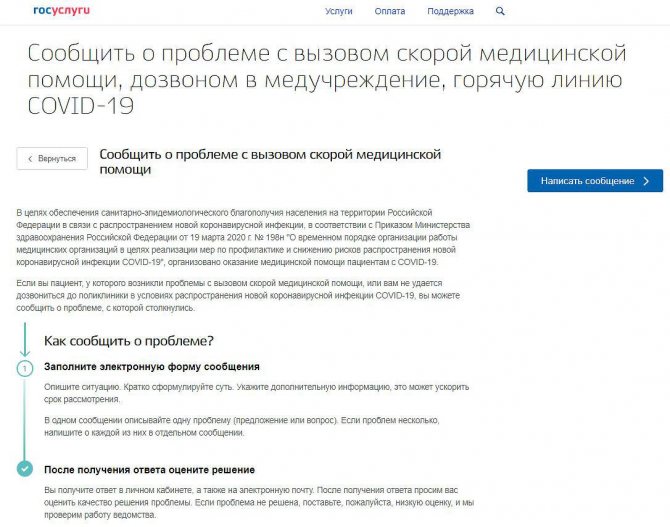Home / Situations
Back
Published: 01/03/2020
Reading time: 4 min
0
1345
The ambulance refused to come when called. What to do in such a situation? What to do and where to complain? Or maybe the actions of health workers are legal? We understand an ambiguous situation.
- Legal norms governing the work of the ambulance. The right of citizens to medical care
- What to do if doctors refuse to come
- Institutions for contacting the head of the ambulance station
- Contacting the police
- Appeal to the Ministry of Health
- To the prosecutor's office
If the ambulance doesn't come
The legislation of the Russian Federation does not provide for special rules and regulations on the provision of emergency medical care and on the procedure for hospitalization in the event of an epidemic, pandemic, or other circumstances. That is, the dispatcher does not have the right to refuse you, citing a “difficult situation.”
If they refuse to send an ambulance to you, you should always act in the same way:
- Request that the dispatcher give your request number.
- Emphasize that there is a real threat to the patient's life or health.
- Report that the refusal to send an ambulance falls under Articles 124, 125 of the Criminal Code of the Russian Federation “Failure to provide assistance to a patient” and “Leaving in danger”, and you will file a statement about this with the police.
In our example, the insistent demand helped immediately: the ambulance arrived and the patient was hospitalized. But, if the above arguments do not work, you should call the police on numbers 02 or 102, or the single number for all emergency services - 112.
At the same time, you need to remember: the dispatcher still has the right not to send an ambulance to you, for example, if he considers that this is a false call or there is no need for emergency or first aid. He bears direct responsibility for his decision, including criminal liability, in the event of the death of the patient or serious damage to health. All emergency calls are recorded. Dispatchers are certainly aware of their responsibilities and usually play it safe.
Rules for drawing up a document
The complaint is drawn up on behalf of the patient or the persons who called the ambulance. The text of the document must contain:
- name of the filing authority;
- Full name and contact details of the applicant;
- description of the situation;
- evidence base;
- list of requirements;
- list of attached certificates;
- date and signature.
The situation must be presented in chronological order from the moment the ambulance was called, mentioning all the essential details: the content of the dialogue with the dispatcher, the actions of the arriving team, subsequent events. It is important to indicate the time of each significant point.
As evidence, you can attach a recording of a conversation with the dispatcher, team doctors, and ambulance station employees. Printouts of call times, medical certificates and bulletins about the patient's health status are also used.
If the cause of the complaint was the actions of the team, which led to a deterioration in the patient’s condition, then it is necessary to describe in detail the measures taken by the doctors and changes in the patient’s condition (for example, after the injection the patient began to have an allergic reaction). When filing a complaint against the actions of specific ambulance employees, you must indicate their full name . You can find out the names of the doctors of the arriving team by submitting a request to the ambulance station, indicating in the request the time of call and arrival of the ambulance.
In the final part of the text, the applicant sets out his demands: analysis of the situation, elimination of the offense and bringing the perpetrators to justice. A sample complaint can be viewed here.
If the actions of an emergency doctor fall under certain articles of the criminal or administrative code, then the numbers and parts of such articles must be indicated in the complaint.
If the ambulance doesn't take you to the hospital
If the emergency doctor refuses to take the patient to the hospital, but, in your opinion, this is necessary, call the control room again and insist on hospitalization. Does not help? Call your local health authority's hotline number.
In truth, they cannot refuse you medical care in principle: Article 41 of the Constitution of the Russian Federation establishes “everyone’s right to health care and medical care.” And that means the only question is how to classify your situation and what type of medical care we are talking about: emergency, ambulance or not, free or paid.
If you have a compulsory health insurance policy (CHI), then you are additionally protected by Federal Law No. 323-FZ dated November 21, 2011. According to it, institutions operating under compulsory medical insurance are prohibited from refusing medical care to the insured.
Medical assistance is provided not only by government, but also by some commercial organizations. You can obtain information about whether a particular commercial structure operates within the compulsory medical insurance framework from the institution itself or on the MHIF (Compulsory Health Insurance Fund) website.
True, the Moldovan citizen from our history did not have a policy. However, any person without documents at all can receive emergency medical care.
In some regions of Russia, the emergency service is divided into two divisions: ambulance and urgent care, but this does not change the essence. Another thing is planned treatment; you really don’t have to carry it out without a policy.
Only a doctor can assess whether a patient requires emergency medical care. He bears criminal liability if he fails to provide assistance and this results in harm of moderate severity or greater1. But this is unlikely to make it any easier for the victim and his relatives, especially if something bad happens.
Hemorrhage
The village of Chernogubovo is just four kilometers from Tver. Country places. River, pine forest. There is a tuberculosis sanatorium here, and with it several houses for the staff. The Kolesov family lives in one of these - dad Sasha, mom Ira, son Vanka and the kindest Newfoundland Robert. There is also a 20-year-old daughter, Nadezhda. But she lives and studies in St. Petersburg.
True, dacha life in Chernogubovo cannot be called dacha life. The sanatorium has been under renovation for two years now. Departmental barracks, where there is no gas, no water, no sewerage, to the horror and despair of former nurses, nannies and cooks, are being destroyed before our eyes. No prospects. But the Kolesovs are doing fine. Dad is a former journalist, works as an industrial climber. Mom works in the regional department of Rosselkhoznadzor. Vanka gets straight A's from a Tver school. More precisely, everything was fine until this very thunderstorm...
We are sitting in the kitchen. Drinking tea. Irina has just been discharged from the clinic of the First St. Petersburg Medical Institute. She'll be going to work soon. Young beautiful woman. And there is fear in her eyes when she tells how it all happened.
“It was as if I had been hit in the chest with a soft pillow!” Okay, there was a chair in the back. I plopped into it. If it weren't for the neighbors, I don't know how it would have ended.
— After my numerous calls, the ambulance finally arrived! - Alexander enters the conversation. - On the third day. I was already carrying Irisha in my arms, excuse the detail, to the toilet. The paramedic injected me with a magnesium solution and recommended that I see a local general practitioner in the morning. In the old way - to the village first-aid post. They refused to admit him to hospital. And in the morning she felt so bad that I was almost screaming into the phone!
At the other end of the line they were even offended:
- Why are you calling 103? Call the Kalinin Central District Hospital!
- What, have our emergency telephone numbers already been cancelled?
- Okay, give me the address...
Do you think the ambulance has arrived? As it turns out later, the alarm signal was forwarded to the regional hospital. There are only two cars there. This is for the entire Kalininsky district, which, by a minute, is larger than Tver itself.

This is the notice hanging at the first aid station. The doctor recently went on maternity leave, but neither the ambulance nor the Central Regional Clinical Hospital knows about it. Photo: Yuri Snegirev/RG
Sasha also called the hospital. There he was told that there were no cars and that the call had been transferred to a general practitioner. He will arrive after 12 and examine the patient.
The Kolesov family does not have a car. Sasha's friend arrived. We took Irina to the general practitioner.
“It’s absolutely impossible to get there,” says Alexander. “I took my wife in my arms as usual and carried her through the mud to the first aid station. I went up to the porch, and there was an announcement: “There is no doctor. No reception. For any questions, please contact the Central Regional Clinical Hospital.” I later found out that the doctor was on maternity leave. So who was our call forwarded to? And how long did we have to wait for the doctor? Probably until he gives birth.
What to do? Let's go to the Central Regional Clinical Hospital. This is 25 kilometers through traffic jams and traffic lights. But on the way, Ira became so ill that Sasha made the only right decision - to break into the regional clinical hospital. She was on the way.
There, as soon as they saw the patient, they immediately realized everything. A gurney and an IV appeared. Hospitalization! This is how Irina was saved.
— By calling 103, when I begged to come, they told me that the patient’s condition was not life-threatening. And I asked: are you quite satisfied with the state of the vegetable? How is this so? We pay taxes on this same ambulance, but there is zero help from it!
“It was as if I had been hit in the chest with a soft pillow!” Okay, there was a chair in the back. I plopped into it
What can I say, recently in Tver itself, where there is asphalt all around and lights are on at night, they waited for an ambulance for a child for four hours! The house where the child suffered was only two (!) blocks from the ambulance substation. And such cases are a dime a dozen! If the investigation is interested, the addresses are in the editorial office.
I visited the ambulance substation. The dispatcher has already been fired. I was able to talk to only one doctor. And that’s because I caught him on the street away from the eyes of his superiors and under an oath of non-disclosure of his identity.
- Why aren’t we going? - the doctor began his tirade. — It’s not at all because there aren’t enough cars. What's the car? Iron. You can buy it. Where can you find people for calls? Everyone left to work. Some are going to St. Petersburg, and some are going to Moscow. The salaries there are, of course, higher. And equipment. And foreign cars. Prestige, in a word. Agree, it’s convenient: I worked 24 hours, three at home with my family. I’m an enthusiast because I work in Tver. Are there many of these?
Irina survived. We wish her good health. Like all of us. There is a pile of pills on the table. Measurement of pressure strictly according to the schedule and recording the result in a student notebook. Salt-free diet. Physical activity is still prohibited. Investigators are looking into who is to blame in criminal case No. 11802280008040069. But these numbers don’t make it any easier for Irina.
If you are denied hospitalization
Now to the question of hospitalization or refusal of it. The law states that a patient is required to provide emergency care in a hospital if:
- there is a threat to his life;
- he is in a condition that requires correction in intensive care units and intensive care units;
- he is in a state that threatens the life and health of others.
Sometimes hospitalization is denied because the hospital does not have the necessary equipment or specialists. But even then, health workers are required to give a referral for hospitalization in another institution, accompany it with explanations and recommendations, and also make an entry about this in a special medical journal. The latter is important for further “debriefing”.
The patient himself, if he is competent and does not pose a threat to others, has the right to refuse hospitalization, even if doctors insist otherwise2. Then he will simply be asked to give a written refusal to hospitalize.
All cases: whether the patient needs help or can manage it, hospitalize it or manage it on his own - depend on the subjective assessment of a specialist. The average person simply cannot know what is right. Whether a medical error was made will become clear after the tragedy, and then the perpetrators will be held accountable.
But it’s unlikely that anyone will wait for a solution, so if they refuse us, we get into the car and take the sick relative to the hospital ourselves. And already in the medical institution itself it may turn out that no one is going to help us.
Service Responsibilities 03
Phone 03 is needed not only for calling an ambulance. The responding specialist is obliged, first of all, to clarify the symptoms of the intended patient and correctly distribute the call to emergency or emergency assistance. His work doesn't end there.
To support the population and possibly provide first aid independently, the operator can give some recommendations to alleviate the patient’s condition and carry out initial measures. Or, on the contrary, express prohibitions on carrying out any actions (for example, carrying or moving a person with possible fractures and ruptures of internal organs).
Upon arrival of the ambulance, doctors are obliged to carefully examine the patient and decide on his immediate hospitalization or carry out medical actions on the spot without going to a medical facility. To do this, they must have appropriate medical equipment and medicines.

However, doctors cannot force the patient to leave his place of residence. The prospective patient may even refuse to go to the hospital by writing a voluntary refusal. Such a document is needed to relieve a person of responsibility from the ambulance personnel who were offered the trip. An adult citizen can write such a paper both on his own behalf and on behalf of his minor child.
By delivering a person by ambulance to the address of his future treatment, he has a better chance of expediting the registration procedure and being escorted to the desired department. This is explained by the fact that the well-being of citizens who arrived independently is supposedly considered more acceptable for long-term waiting in line than those who arrived by ambulance.
If the hospital refuses help
Or they do not directly refuse, but health workers do not take measures to clarify the diagnosis and treatment. What to do in this case?
The first piece of advice is not of a legal nature: first, make sure that the issue cannot be resolved by talking on the spot. Remember, the staff of the institution where the patient was brought is obliged to provide assistance to him as long as the threat to life and health remains.
As a rule, you can get through with simple human conversation, especially if you put yourself in the doctors’ shoes. It didn’t work out - you need to move on and solve the problem, for example, with the head physician. Very often, questions that arise at the level of line personnel magically disappear; it is worth contacting someone from the management team.
If negotiations do not help, take the situation to the legal plane, but remember that you need to be on your guard. My personal experience shows: when it seems that the situation is critical, it is better to accompany the patient everywhere and control what is happening as much as possible. Doctors are doctors, but don’t forget about the human factor, when someone forgot something, overlooked something, missed something - and time was lost.
Who can complain about what?
All users registered on Gosuslugi can express dissatisfaction with the work of the Russian ambulance. Even simplified account holders have the opportunity to leave feedback.

Complaint form
Russians can, for example, tell how many hours it took them to call a brigade, and how many hours later the service with the word “ambulance” in its name ensured its arrival at the specified address.
When submitting a review, certain rules apply. In particular, one message should describe only one problem, suggestion or question. If there are several complaints, you must send a separate message for each of them.
It is not yet known how often and in what quantity such reviews can be left from one account, and how quickly they will be collected for further analysis. Meanwhile, the problem has acquired an all-Russian scale, as evidenced by its mention by the President of Russia himself.

The rules for writing a review for an ambulance or clinic are very simple
The response to each request will be provided to the user in his personal account on State Services and additionally sent to him by email. After receiving the answer, it will be possible to evaluate the quality of the solution to the question posed - if it is unsatisfactory (for example, the ambulance still takes hours or does not want to send a team at all), then you need to give the lowest possible rating. In this case, an audit of the agency’s work will be initiated.










